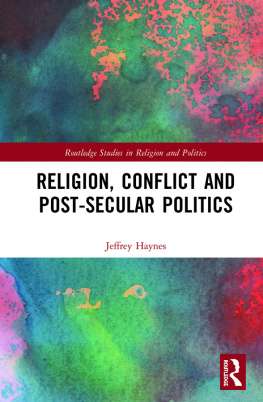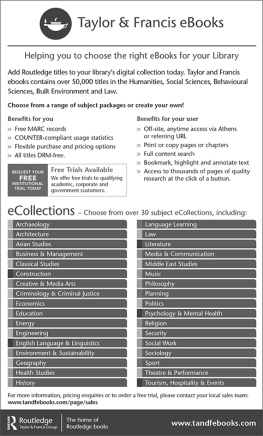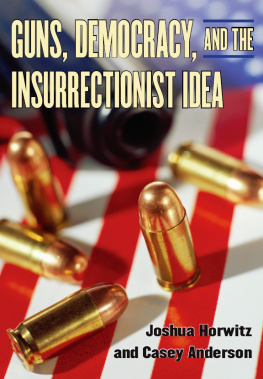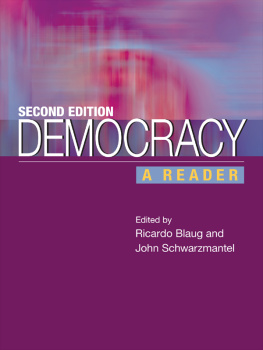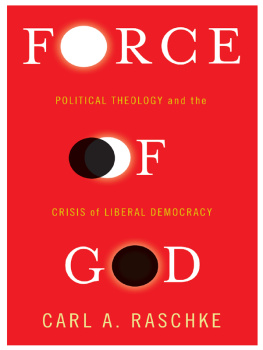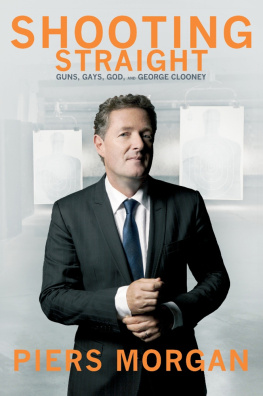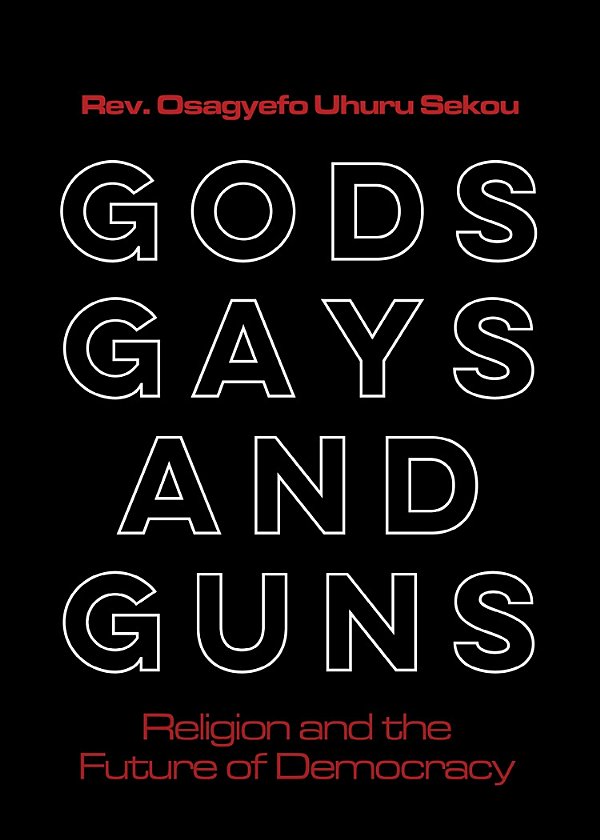Acclaim for first edition of God, Gays, and Guns
Rev. Sekou is one of the most courageous and prophetic voices of our time. His allegiance to the legacy of Martin Luther King, Jr. is strong, and his witness is real. Dont miss this book!
Cornel West, Harvard University,
author of Race Matters
Gods, Gays, and Guns is a powerful and provocative manifesto that challenges old perceptions about race, sexuality, gender, and power. Its theoretical brilliance is complemented by the authors accessible literary style and eloquence in the theological arguments advanced in this critical study. Gods, Gays, and Guns offers a visionary, black liberationist theology for addressing the great challenges facing America and the world in an era of war, racism, and violence. Rev. Osagyefo Uhuru Sekou has produced a monumental treatise that offers hope and courage, not only for the oppressed, but all humanity.
Manning Marable,
author of Malcolm X: A Life of Reinvention
This is a hopeful book. The occupy movement has stirred awareness here in America and elsewhere that we may be on the threshold of momentous change. But where will the fresh ideas, the leadership and, most importantly, the sustaining spirit for such a change originate? Rev. Sekous energetic, thoughtful and engaging book begins to answer some of these questions, and indeed the author himself embodies some of those answers.
Harvey Cox, Harvard University
The essays in Gods, Gays, and Guns are the result of deep immersion, in suffering and struggle, yes, but also in the ideas, political, theological, artistic, and above all democratic, that may make a difference. Sekou gives us something rarer and more valuable: a book of powerful questions.
Jeff Sharlet, author of The Family
Copyright
Copyright 2017 by Osagyefo Sekou.
Contains material previously published in Gods, Gays, and Guns (Cambridge, Mass.: Campbell & Cannon Press, 2012). This revised edition also includes new material.
All rights reserved. For permission to reuse content, please contact Copyright Clearance Center, 222 Rosewood Drive, Danvers, MA 01923, (978) 750-8400, www.copyright.com .
Cover design: James Gates
ChalicePress.com
Print: 9780827212855
EPUB: 9780827212862 EPDF: 9780827212879
Contents
Prologue: Worshiping Whiteness
The slave ship trafficked not only in black bodies but in the religion of whiteness. Although ethnic, gender, and class struggle and systemic oppression were prevalent in the history of the Old World, these inequalities merged with vengeance and passion in the New World. Social immorality is part of the very fabric of the United States. Hypocrisya political act with spiritual implicationssits at the heart of this fragile democracy.
As Thomas Jefferson penned the letters that would set the tone for American polity and promote democratic ideals around the world, he himself owned slaves and had an illicit relationship that produced children of bondage whom he refused to free. The soul of America holds both grand ideals and grandiose contradictionsthe Jeffersonian legacy of immorality. The sacred texts of civil religionthe Declaration of Independence and The Constitution drip with hypocrisy; half of the founding fathers owned slaves, and all supported slavery in deed. High idealsall men created equal to pursue life, liberty, and pursuit of happinessare subjugated to the rights of land- and life-owning white men. Victorian ethosfueling much of American jurisprudenceprotected white womens virtue while African slaves were raped. The very roots of American civilization are watered with the blood of black denigration.
And this is idolatrous.
Whiteness is a racist ideological system that structures internationally modes of production and spiritual apparition that manipulate personal and social relations. It is a praxis of social inequality based on race, sex, and classcoalescing along a continuum of ways in which the United States categorizes humanity and shaping the ways in which individuals and institutions regard and implement power, privilege, and prestige. Straight white maleness is presented as what it means to be fully human. Under this rubric, all ideas and ideals are subject to this system, and the nonmaterial values are commodified.
Moreover, whiteness manipulates religion to affirm conservative politics. White evangelicals are more white than Christian; at best, they worship a white Jesus. In the debate on morality in America, white evangelicals often argue that the nation has been heading down the wrong path. President Obamas affirmation of same-sex marriage has raised evangelical ire. While polls indicate that Americans are evenly split over the issue, a multiracial chorus of evangelicals has sung a sad song of dismay, with the refrain: Pro-gay marriage is anti-Christian.
What is really at stake in this recent dust up is the age-old tension between religion and democracy in the United States. One way to read the history of the United States is to comprehend the way in which religion has been used to either expand or restrict democracy.
There were conservative religious leaders who used the story of Ham, and the apostle Pauls admonishment for slaves to be obedient to their masters, to justify chattel slavery. In response, Harriet Tubman, Sojouner Truth, and a host of other Christians used the Bible to justify the inclusion of African Americans in the promise of American democracy.
While evangelicals used Bible verses to deny women the right to vote, a very religious Frederick Douglass and the suffrage movement used the Bible to support the full enfranchisment of women. In solitary confinement on an Easter weekend, Rev. Dr. Martin Luther King Jr. responded to the criticism from conservative clergy who thought his voting rights campaign was ill-timed. Today, Kings Letter from a Brimingham Jail is considered one of the greatest religious letters of the 20th century. Even though the evangelicals cast Roe v. Wade as Christian vs. anti-Christian, it has its origins in a pro-choice gathering of United Methodist Women in a Texas church basement.
These facts reveal that the kind of religion that has served to strengthen American democracy has been the kind of religion that sought to expand democratic opportunity for the historically otheredsuch as African Americans and women. Prophetic religion, particularly the Christian form, has played a key role in securing democracys future by emphasizing the worth and dignity of all citizens. It has done this with a liberal reading of the Bible, in tandem with The Constitution and Declaration of Independence .
What can be termed as the religious precedent for democracy expansion is the historical litmus test for the role of religion in democracy. Religion must be used to expand democratic opportunity, not restrict it. The gay marriage debate is not about religion but about what kind of religion will prevail in the public discourse and policy. As pundits and politicians have courtedif not cow-towed toconservative evangelical leaders, they have forgotten that evangelicals have tended to be on the wrong side of history.
For instance, the largest and most powerful evangelical denomination in the country, the Southern Baptist Convention, does not allow women to serve as pastors, andthrough its lobbying armhas supported anti-choice, antigay marriage, and anti-immigrant agendas.
Rev. Billy Graham is another example of the evangelical tendency to lag behind in social progress. Rev. Graham, the undisputed leader of American evangelicalism for the past five decades, used a biblical argument to support the passage of a North Carolina constitutional amendment banning gay marriage. In the same manner, Graham refused to denounce segregation after a direct appeal from Dr. King in 1957.


